小学英语语法要点及习题总结
小学英语六年级总复习语法及练习题一
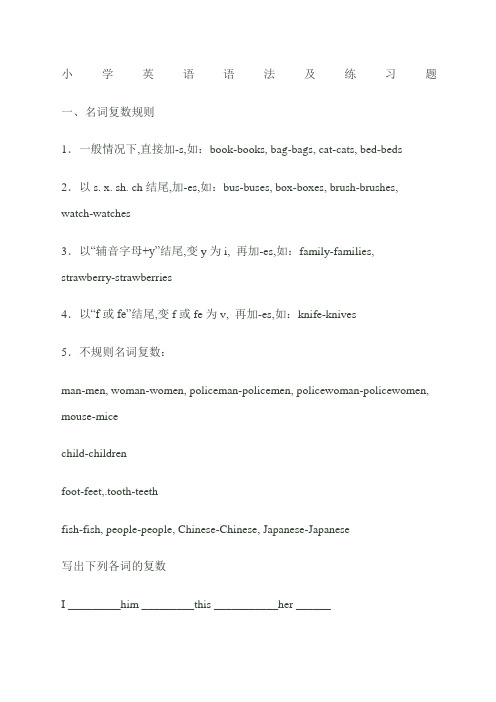
小学英语语法及练习题一、名词复数规则1.一般情况下,直接加-s,如:book-books, bag-bags, cat-cats, bed-beds 2.以s. x. sh. ch结尾,加-es,如:bus-buses, box-boxes, brush-brushes, watch-watches3.以“辅音字母+y”结尾,变y为i, 再加-es,如:family-families, strawberry-strawberries4.以“f或fe”结尾,变f或fe为v, 再加-es,如:knife-knives5.不规则名词复数:man-men, woman-women, policeman-policemen, policewoman-policewomen, mouse-micechild-childrenfoot-feet,.tooth-teethfish-fish, people-people, Chinese-Chinese, Japanese-Japanese写出下列各词的复数I _________him _________this ___________her ______watch _______child _______photo ________diary ______day________ foot________ book_______ dress ________tooth_______ sheep ______box_______ strawberry _____thief _______yo-yo ______ peach______ sandwich ______man______ woman_______ paper_______ juice___________water________ milk________ rice__________ tea__________二、一般现在时一般现在时基本用法介绍No. 1一般现在时的功能1.表示事物或人物的特征、状态;如:The sky is blue.天空是蓝色的;2.表示经常性或习惯性的动作;如:I get up at six every day.我每天六点起床;3.表示客观现实;如:The earth goes around the sun.地球绕着太阳转;一般现在时的构成1. be动词:主语+beam,is,are+其它;如:I am a boy.我是一个男孩;2.行为动词:主语+行为动词+其它;如:We study English.我们学习英语;当主语为第三人称单数he, she,it时,要在动词后加"-s"或"-es";如:Mary likes Chinese.玛丽喜欢汉语;一般现在时的变化1. be动词的变化;否定句:主语+ be + not +其它;如:He is not a worker.他不是工人;一般疑问句:Be +主语+其它;如:-Are you a student-Yes. I am. / No, I'm not.特殊疑问句:疑问词+一般疑问句;如:Where is my bike2.行为动词的变化;否定句:主语+ don't doesn't +动词原形+其它;如:I don't like bread.当主语为第三人称单数时,要用doesn't构成否定句;如:He doesn't often play.一般疑问句:Do Does +主语+动词原形+其它;如:- Do you often play football- Yes, I do. / No, I don't.当主语为第三人称单数时,要用does构成一般疑问句;如:- Does she go to work by bike- Yes, she does. / No, she doesn't.特殊疑问句:疑问词+一般疑问句;如:How does your father go to work 动词+s的变化规则1.一般情况下,直接加-s,如:cook-cooks, milk-milks2.以s. x. sh. ch. o结尾,加-es,如:guess-guesses, wash-washes,watch-watches, go-goes3.以“辅音字母+y”结尾,变y为i, 再加-es,如:study-studies一般现在时用法专练:一、写出下列动词的第三人称单数drink ________ go _______ stay ________ make ________look _________ have_______ pass_______ carry ____ come________ watch______ plant_______ fly ________ study_______ brush________ do_________ teach_______二、用括号内动词的适当形式填空;1. He often ________have dinner at home.2. Daniel and Tommy _______be in Class One.3. We _______not watch TV on Monday.4. Nick _______not go to the zoo on Sunday.5. ______ they ________like the World Cup6. What _______they often _______do on Saturdays7. _______ your parents _______read newspapers every day8. The girl _______teach us English on Sundays.9. She and I ________take a walk together every evening.10. There ________be some water in the bottle.11. Mike _______like cooking.12. They _______have the same hobby.13. My aunt _______look after her baby carefully.14. You always _______do your homework well.15. I _______be ill. I’m staying in bed.16. She _______go to school from Monday to Friday.17. Liu Tao _______do not like PE.18. The child often _______watch TV in the evening.19. Su Hai and Su Yang _______have eight lessons this term.20. -What day _______be it today-It’s Saturday.三、按照要求改写句子1. Daniel watches TV every evening.改为否定句___________________________________________________2. I do my homework every day.改为一般疑问句,作否定回答________________________________________________________ 3. She likes milk.改为一般疑问句,作肯定回答___________________________4. Amy likes playing computer games.改为一般疑问句,作否定回答___________________________________________________5. We go to school every morning.改为否定句_______________________________________________________ 6. He speaks English very well.改为否定句___________________________________________________7. I like taking photos in the park.对划线部分提问________________________________________________________ 8. John comes from Canada.对划线部分提问___________________________________________________9. She is always a good student.改为一般疑问句,作否定回答________________________________________________________ 10. Simon and Daniel like going skating.改为否定句___________________________________________________五、改错划出错误的地方,将正确的写在横线上1. Is your brother speak English __________________2. Does he likes going fishing __________________3. He likes play games after class. __________________4. Mr. Wu teachs us English. __________________5. She don’t do her homework on Sundays. _________________三、现在进行时1.现在进行时表示现在正在进行或发生的动作,也可表示当前一段时间内的活动或现阶段正在进行的动作;2.现在进行时的肯定句基本结构为be+动词ing.3.现在进行时的否定句在be后加not;4.现在进行时的一般疑问句把be动词调到句首;5.现在进行时的特殊疑问的基本结构为:疑问词不达意+ be + 主语+ 动词ing但疑问词当主语时其结构为:疑问词不达意+ be + 动词ing动词加ing的变化规则1.一般情况下,直接加ing,如:cook-cooking2.以不发音的e结尾,去e加ing,如:make-making, taste-tasting3.如果末尾是一个元音字母和一个辅音字母,双写末尾的辅音字母,再加ing,如:run-running, stop-stopping现在进行时专项练习:一、写出下列动词的现在分词:play________ run__________ swim _________make__________go_________ like________ write________ _ski___________read________ have_________ sing ________ dance_________put_________ see________ buy _________ love____________live_______ take_________ come ________ get_________stop_________ sit ________ begin________ shop___________二、用所给的动词的正确形式填空:1.The boy __________________ drawa picture now.2. Listen .Some girls _______________ singin the classroom .3. My mother _________________ cook some nice food now.4. What _____ you ______ do now5. Look . They _______________ have an English lesson .6.They ____________not ,water the flowers now.7.Look the girls ________________dance in the classroom .8.What is our granddaughter doing She _________listen to music.9. It’s 5 o’clock now. We _____________havesupper now10.______Helen____________wash clothes Yes ,she is .三、句型转换:1. They are doing housework .分别改成一般疑问句和否定句__________________________________________________________________________________________________________________________ 2.The students are cleaning the classroom . 改一般疑问句并作肯定和否定回答________________________________________________________________ _________________________________________________________________ _3.I’m playing the football in the playground .对划线部分进行提问________________________________________________________________ _4.Tom is reading books in his study . 对划线部分进行提问四、将来时理论及练习一、概念:表示将要发生的动作或存在的状态及打算、计划或准备做某事;句中一般有以下时间状语:tomorrow, next dayweek, month, year…,soon, the day after tomorrow后天等;二、基本结构:①be going to + do;②will+ do.三、否定句:在be动词am, is, arel后加not或情态动词will后加not成won’t;例如:I’m going to have a picnic this afternoon.→ I’m not going to have a picnic this afternoon.四、一般疑问句:be或will提到句首,some改为any, and改为or,第一二人称互换;例如:We are going to go on an outing this weekend. → Are you going to go on an outing this weekend五、对划线部分提问;一般情况,一般将来时的对划线部分有三种情况;1. 问人;Who 例如:I’m going to New York soon. →Who’s going to New York soon.2. 问干什么;What … do.例如:My father is going to watch a race with me thisafternoon. →What is your father going to do with you this afternoon.3. 问什么时候;When.例如:She’s going to go to bed at nine. →When is she goingto bed六、同义句:be going to = willI am going to go swimming tomorrow明天. = I will go swimming tomorrow. 练习:填空;1. 我打算明天和朋友去野炊;I_____ _______ _________ have a picnic with my friends.I ________ have a picnic with my friends.2. 下个星期一你打算去干嘛我想去打篮球;What ________ ________ _________ _________ _________ next Monday I _______ ______ _____ play basketball.What _________ you do next Monday I ________ play basketball.3. 你妈妈这个周末去购物吗是,她要去买一些水果;_____ your mother _______ ________ go shopping this ___________Yes, she _________. She ______ ________ __________ buy some fruit.4. 你们打算什么时候见面;What time _______ you _________ __________ meet改句子;5. Nancy is going to go camping.改否定Nancy ________ going to go camping.6. I’ll go and join them.改否定I _______ go ______ join them.7. I’m going to get up at 6:30 tomorrow.改一般疑问句________ _______ ________ to get up at 6:30 tomorrow8. We will meet at the bus stop at 10:30.改一般疑问句_______ ________ meet at the bus stop at 10:30.9. She is going to listen to music after school.对划线部分提问________ _______ she ________ ________ _________ after school10. My father and mother are going to see a play the day after tomorrow.同上_________ _________ going to see a play the day after tomorrow.用所给词的适当形式填空;11. Today is a sunny day. We ___________________ have a picnic this afternoon.12. My brother _______________ go to Shanghai next week.13. Tom often ______________go to school on foot. But today is rain. He ______________ go to school by bike.14. What do you usually do at weekends I usually __________ watch TV and ____________catch insects15. It’s Friday today. What _____she _________ do this weekend She ______________ watch TV and _____________ catch insects.16. What ___________ d0 you do last Sunday I ____________ pick apples on a farm. What ______________ do next Sunday I ______________ milk cows.17. Mary ____________ visit her grandparents tomorrow.18. Liu Tao ____________ fly kites in the playground yesterday.19. David ______________ give a puppet show next Monday.20. I ________________ plan for my study now五、一般过去时1.一般过去时表示过去某个时间发生的动作或存在的状态,常和表示过去的时间状语连用;一般过去时也表示过去经常或反复发生的动作感谢; 2.Be动词在一般过去时中的变化:⑴am 和is在一般过去时中变为was;was not=wasn’t⑵are在一般过去时中变为were;were not=weren’t⑶带有was或were的句子,其否定、疑问的变化和is, am, are一样,即否定句在was或were后加not,一般疑问句把was或were调到句首;3.句中没有be动词的一般过去时的句子否定句:didn’t +动词原形,如:Jim didn’t go home yesterday.一般疑问句:在句首加did,句子中的动词过去式变回原形;如:Did Jim go home yesterday特殊疑问句:⑴疑问词+did+主语+动词原形如:What did Jim do yesterday⑵疑问词当主语时:疑问词+动词过去式如:Who went to home yesterday动词过去式变化规则:1.一般在动词末尾加-ed,如:pull-pulled, cook-cooked2.结尾是e加d,如:taste-tasted3.末尾只有一个元音字母和一个辅音字母的重读闭音节,应双写末尾的辅音字母,再加-ed,如:stop-stopped4.以“辅音字母+y”结尾的,变y为i, 再加-ed,如:study-studied5.不规则动词过去式:am,is-was, are-were, do-did, see-saw, say-said, give-gave, get-got, go-went, come-came, have-had, eat-ate, take-took, run-ran, sing-sang, put-put,make-made, read-read, write-wrote, draw-drew, drink-drank, fly-flew, ride-rode, speak-spoke, sweep-swept, swim-swam, sit-sat过去时练习写出下列动词的过去式isam_________ fly_______ plant________ are ________drink_________ play_______ go________ make ________does_________ dance________ worry________ ask _____taste_________ eat__________ draw________ put ______throw________ kick_________ pass_______ do ________Be动词的过去时练习1Name ____________ No. ______ Date __________一、用be动词的适当形式填空1. I _______ at school just now.2. He ________ at the camp last week.3. We ________ students two years ago.4. They ________ on the farm a moment ago.5. Yang Ling ________ eleven years old last year.6. There ________ an apple on the plate yesterday.7. There ________ some milk in the fridge on Sunday.8. The mobile phone _______ on the sofa yesterday evening.二、句型转换1. It was exciting.否定句:________________________________________________ 一般疑问句:____________________________________________ 肯、否定回答:__________________________________________ 2. All the students were very excited.否定句:________________________________________________一般疑问句:____________________________________________ 肯、否定回答:__________________________________________ 3. They were in his pocket.否定句:________________________________________________ 一般疑问句:____________________________________________ 肯、否定回答:__________________________________________ Be动词的过去时练习2Name ____________ No. ______ Date __________一、用be动词的适当形式填空1. I ______ an English teacher now.2. She _______ happy yesterday.3. They _______ glad to see each other last month.4. Helen and Nancy ________ good friends.5. The little dog _____ two years old this year.6. Look, there ________ lots of grapes here.7. There ________ a sign on the chair on Monday..8. Today _____ the second of June. Yesterday ______ the first of June. It _____ Children’s Day. All the students ______ very excited.二、句型转换1. There was a car in front of the house just now.否定句:________________________________________________一般疑问句:____________________________________________肯、否定回答:__________________________________________肯、否定回答:__________________________________________三、中译英1.我的故事书刚才还在手表旁边;___________________________________________________________ 2.他们的外套上个礼拜放在卧室里了;___________________________________________________________ 3.一会以前花园里有两只小鸟;行为动词的过去时练习1Name ____________ No. ______ Date __________一、用行为动词的适当形式填空1. He _________ live in Wuxi two years ago.2. The cat ________ eat a bird last night.3. We _______ have a party last Halloween.4. Nancy ________ pick up oranges on the farm last week.5. I ________ make a model ship with Mike yesterday.6. They ________ play chess in the classroom last PE lesson.7. My mother _______ cook a nice food last Spring Festival.8. The girls ________ sing and _______ dance at the party.二、句型转换1. Su Hai took some photos at the Sports day.否定句:________________________________________________ 一般疑问句:____________________________________________ 肯、否定回答:__________________________________________2. Nancy went to school early.否定句:________________________________________________ 一般疑问句:____________________________________________ 肯、否定回答:__________________________________________ 3. We sang some English songs.否定句:________________________________________________ 一般疑问句:____________________________________________ 肯、否定回答:__________________________________________ 行为动词的过去时练习2Name ____________ No. ______ Date __________一、用be动词的适当形式填空1. I ______ watch a cartoon on Saturday.2. Her father _______ read a newspaper last night.3. We _________ to zoo yesterday, we _____ to the park. go4. ______ you _______ visit your relatives last Spring Festival5. ______ he _______ fly a kite on Sunday Yes, he ______.6. Gao Shan _______ pull up carrots last National Day holiday.7. I ____________ sweep the floor yesterday, but my mother ______.8. What ______ she _______ find in the garden last morning She __________ find a beautiful butterfly.二、句型转换1. They played football in the playground.否定句:________________________________________________一般疑问句:____________________________________________肯、否定回答:__________________________________________三、中译英1. 格林先生去年住在中国;________________________________________________________2. 昨天我们参观了农场;________________________________________________________3. 他刚才在找他的手机;________________________________________________________ 过去时综合练习1Name ____________ No. ______ Date __________一、用动词的适当形式填空1. It ______ be Ben’s birthday last Friday.2. We all ______ have a good time last night.3. He ________ jump high on last Sports Day.4. Helen ________ milk a cow on Friday.5. She likes ______ newspapers, but she ______ a book yesterday. read6. He _______ football now, but they _______ basketball just now. play7. Jim’s mother _________ plant trees just now.8. _______ they ________ sweep the floor on Sunday No, they _____.9. I _______ watch a cartoon on Monday.10. We ___________ go to school on Sunday.。
PEP小学英语语法要点及精选习题-答案
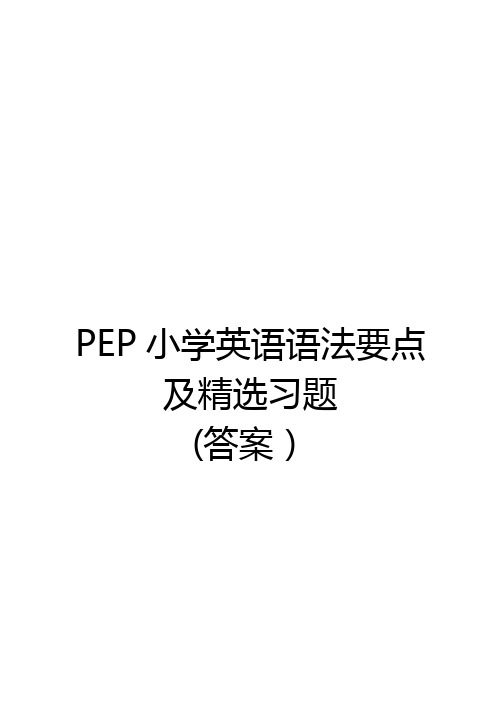
一、写出下列动词的现在分词:
play_playing_run__running__swim __swimming__make__making___
go___going___ski__skiing___
read_reading_have__having__sing __singing___dance_dancing__
3.What are you doingin the playground?
4.What isTomdoing in his study?
四、一般将来时
一、填空。
1。我打算明天和朋友去野炊。
Iamgoingtohave a picnic with my friends。
Iwillhave a picnic with my friends。
come - camehave - hadeat - atetake - took
run - ransing - sangput - putmake - made
read - readwrite - wrotedraw - drewdrink - drank
fly - flewride - rodespeak - spokesweep - swept
19. Davidwill givea puppet show next Monday.
20. Iis planningfor my study now
五、一般过去时
am,is - wasare - weredo - didsee - saw
say - saidgive - gaveget - gotgo - went
looklooksdrawdrawsdropdropsgivegives
小学英语语法重点归纳总结大全

小学英语语法重点归纳总结大全一、名词(Nouns)名词是用来表示人、动物、物体、地点、抽象概念等事物的名称。
在英语中,名词一般有单数和复数两种形式。
以下是一些常见名词的复数形式变化规则:1. 以辅音字母+y结尾的名词,将y变为i,再加es,如:baby → babies2. 以o结尾的名词,有的加es,有的只加s,如:potato → potatoes,photo → photos3. 以f或fe结尾的名词,将f或fe变为v,再加es,如:leaf → leaves,knife → knives4. 以辅音字母+oo结尾的名词,将oo变为ee,再加s,如:zoo → zoos5. 以元音字母+oo结尾的名词,直接加s,如:kangaroo → kangaroos6. 以辅音字母+o结尾的名词,直接加es,如:tomato → tomatoes7. 以辅音字母+y结尾的名词,直接加s,如:boy → boys8. 不规则的复数形式,如:woman → women,man → men,child→ children二、代词(Pronouns)代词是用来替代名词的词语。
常见的代词有主格代词、宾格代词、形容词性物主代词、名词性物主代词和反身代词。
1. 主格代词(Subject Pronouns):单数形式:I,you,he,she,it复数形式:we,you,they2. 宾格代词(Object Pronouns):单数形式:me,you,him,her,it复数形式:us,you,them3. 形容词性物主代词(Possessive Adjectives):单数形式:my,your,his,her,its复数形式:our,your,their4. 名词性物主代词(Possessive Pronouns):单数形式:mine,yours,his,hers,its复数形式:ours,yours,theirs5. 反身代词(Reflexive Pronouns):单数形式:myself,yourself,himself,herself,itself复数形式:ourselves,yourselves,themselves三、动词(Verbs)动词是表达动作、状态或存在的词语。
(完整版)小学英语语法总结全集
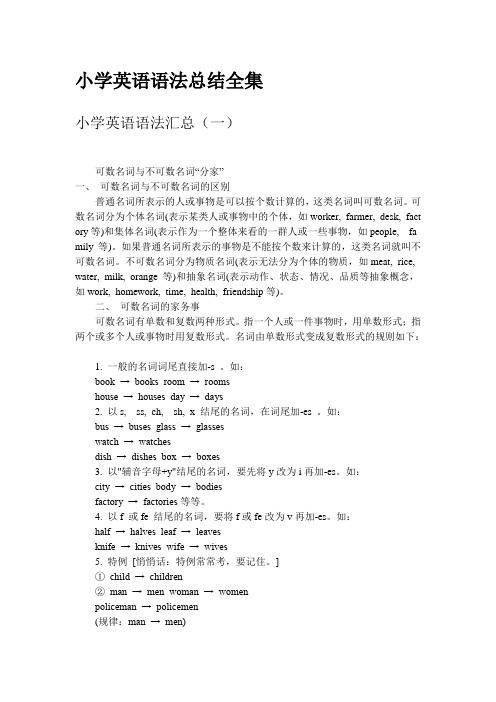
小学英语语法总结全集小学英语语法汇总(一)可数名词与不可数名词“分家”一、可数名词与不可数名词的区别普通名词所表示的人或事物是可以按个数计算的,这类名词叫可数名词。
可数名词分为个体名词(表示某类人或事物中的个体,如worker, farmer, desk, fact ory等)和集体名词(表示作为一个整体来看的一群人或一些事物,如people,fa mily 等)。
如果普通名词所表示的事物是不能按个数来计算的,这类名词就叫不可数名词。
不可数名词分为物质名词(表示无法分为个体的物质,如meat, rice, water, milk, orange 等)和抽象名词(表示动作、状态、情况、品质等抽象概念,如work, homework, time, health, friendship等)。
二、可数名词的家务事可数名词有单数和复数两种形式。
指一个人或一件事物时,用单数形式;指两个或多个人或事物时用复数形式。
名词由单数形式变成复数形式的规则如下:1. 一般的名词词尾直接加-s 。
如:book → books room → roomshouse → houses day → days2. 以s,ss, ch,sh, x 结尾的名词,在词尾加-es 。
如:bus → buses glass → glasseswatch → watchesdish → dishes box → boxes3. 以"辅音字母+y"结尾的名词,要先将y改为i再加-es。
如:city → cities body → bodiesfactory → factories等等。
4. 以f 或fe 结尾的名词,要将f或fe改为v再加-es。
如:half → halves leaf → leavesknife → knives wife → wives5. 特例[悄悄话:特例常常考,要记住。
]①child → children②man → men woman → womenpoliceman → policemen(规律:man → men)③tomato → tomatoespotato → potatoes[悄悄话:初中英语以o 结尾的名词变复数时只有这两个词加-es,其余的当然加-s喽!如:photo → photos ]④foot → feet tooth → teeth[悄悄话:oo变成ee。
小学英语语法知识要点总结

小学英语语法知识要点总结小学英语语法知识要点总结(通用5篇)英语的学习很大部分靠记忆,小学生想要学好英语,平时就要多复习学过的英语知识。
下面是店铺为大家整理的小学英语语法知识归纳,希望对大家有用!小学英语语法知识要点总结篇1一、一般将来时1) shall用于第一人称,常被will 所代替。
will 在陈述句中用于各人称,在争求意见时常用于第二人称。
Which paragraph shall I read first.Will you be at home at seven this evening?2) be going to +不定式,表示将来。
a. 主语的意图,即将做某事。
What are you going to do tomorrow?b. 计划,安排要发生的事。
The play is going to be produced next month。
c. 有迹象要发生的事Look at the dark clouds, there is going to be a storm.3) be +不定式表将来,按计划或正式安排将发生的'事。
We are to discuss the report next Saturday.4) be about to +不定式,意为马上做某事。
He is about to leave for Beijing.注意:be about to 不能与tomorrow, next week 等表示明确将来时的时间状语连用。
一、一般过去时的用法1)在确定的过去时间里所发生的动作或存在的状态。
时间状语有:yesterday, last week, an hour ago, the other day, in 1982等。
Where did you go just now?2)表示在过去一段时间内,经常性或习惯性的动作。
When I was a child, I often played football in the street.Whenever the Browns went during their visit, they were givena warm welcome.3)句型:It is time for sb. to do sth "到时间了" "该了"It is time sb. did sth. "时间已迟了" "早该了"It is time for you to go to bed. 你该睡觉了。
小学英语语法及习题 四大基本时态
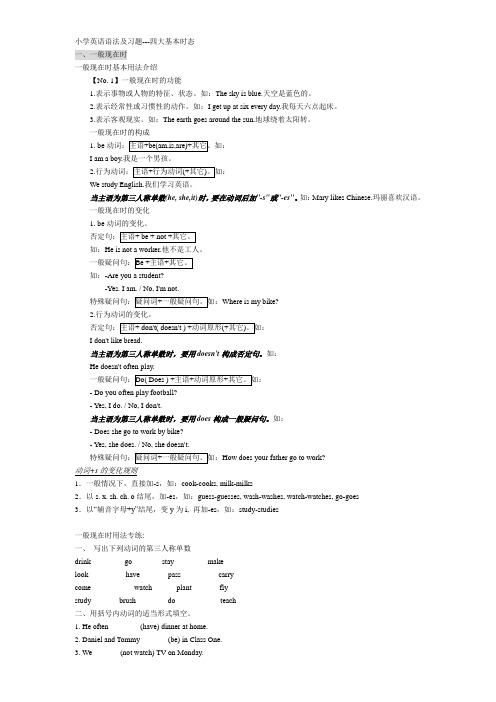
小学英语语法及习题---四大基本时态一、一般现在时一般现在时基本用法介绍【No. 1】一般现在时的功能1.表示事物或人物的特征、状态。
如:The sky is blue.天空是蓝色的。
2.表示经常性或习惯性的动作。
如:I get up at six every day.我每天六点起床。
3.表示客观现实。
如:The earth goes around the sun.地球绕着太阳转。
一般现在时的构成1. beI am a boy.我是一个男孩。
2.We study English.我们学习英语。
当主语为第三人称单数(he, she,it)时,要在动词后加"-s"或"-es"。
如:Mary likes Chinese.玛丽喜欢汉语。
一般现在时的变化1. be动词的变化。
如:He is not a worker.他不是工人。
如:-Are you a student?-Yes. I am. / No, I'm not.Where is my bike?2.行为动词的变化。
I don't like bread.当主语为第三人称单数时,要用doesn't构成否定句。
如:He doesn't often play.- Do you often play football?- Yes, I do. / No, I don't.当主语为第三人称单数时,要用does构成一般疑问句。
如:- Does she go to work by bike?- Yes, she does. / No, she doesn't.How does your father go to work?动词+s的变化规则1.一般情况下,直接加-s,如:cook-cooks, milk-milks2.以s. x. sh. ch. o结尾,加-es,如:guess-guesses, wash-washes, watch-watches, go-goes3.以“辅音字母+y”结尾,变y为i, 再加-es,如:study-studies一般现在时用法专练:一、写出下列动词的第三人称单数drink ________ go _______ stay ________ make ________look _________ have_______ pass_______ carry ____come________ watch______ plant_______ fly ________study_______ brush________ do_________ teach_______二、用括号内动词的适当形式填空。
小学英语语法要点及习题总结

小学英语语法要点及习题(名词复数规则)1.一般情况下,直接加-s,如:book-books,bag-bags,cat-cats,bed-beds2.以s.x.sh.ch结尾,加-es,如:bus-buses,box-boxes,brush-brushes,watch-watches3.以“辅音字母+y”结尾,变y为i,再加-es,如:family-families,strawberry-strawberries4.以“f或fe”结尾,变f或fe为v,再加-es,如:knife-knives5.不规则名词复数:man-menwoman-womenpoliceman-policemenpolicewoman-policewomenmouse-micechild-childrenfoot-feettooth-teethfish-fishpeople-peopleChinese-ChineseJapanese-Japanese小练习:写出下列各词的复数I_________him_________this___________her______watch_______child_______photo________diary______day________foot________book_______dress________tooth_______sheep______box_______strawberry_____thief_______yo-yo______peach______sandwich______man______woman_______paper_______juice___________water________milk________rice__________tea__________小学英语语法总结及习题(一般现在时)一般现在时基本用法介绍【No.1】一般现在时的功能1.表示事物或人物的特征、状态。
中心小学英语语法总结归纳
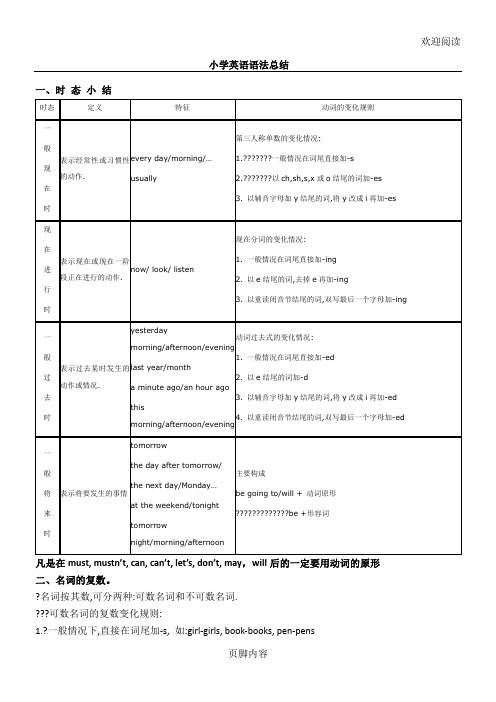
欢迎阅读小学英语语法总结一、时态小结凡是在must, mustn’t, can, can’t, let’s, don’t, may,will后的一定要用动词的原形二、名词的复数。
?名词按其数,可分两种:可数名词和不可数名词.???可数名词的复数变化规则:1.?一般情况下,直接在词尾加-s, 如:girl-girls, book-books, pen-pens2.?以s,x,sh,ch结尾的词,在词后加-es, 如:class-classes, box-boxes, match-matches,3.?以辅音字母+y结尾的,变y 为i 再加-es, 如:city-cities, family-families, country- countries4.?以f或fe结尾的,变f或fe为v再加-es, 如:knife-knives, wife-wives, life-lives,5.?以o 结尾的加-es或-s, 如: radio-radios, tomato-tomatoes, potato-potatoes, zoo-zoos, photo-photos,6.?man-men, woman-women, foot-feet, child-children,三、形容词的比较级、最高级。
????形容词有比较级与最高级之分, 单音节词的变化规则:1.?一般情况下,直接在词尾加-er或-est, 如:small-smaller-smallest, short-shorter-shortest?六.特殊疑问词?What is this??What is this in English??What is the matter??What is the weather like????Where+ v. (be动词/助动词)+sb. +…?When +v. (be动词/助动词)+ sb.+…?Who +v. (be动词/助动词/行为动词)+sb.+…?Why +v. (be动词/助动词)+ sb. +…?※有can, will, must这几个词的句子,所有的句型转换都在此词变化。
小学英语语法要点总结及习题(附答案)
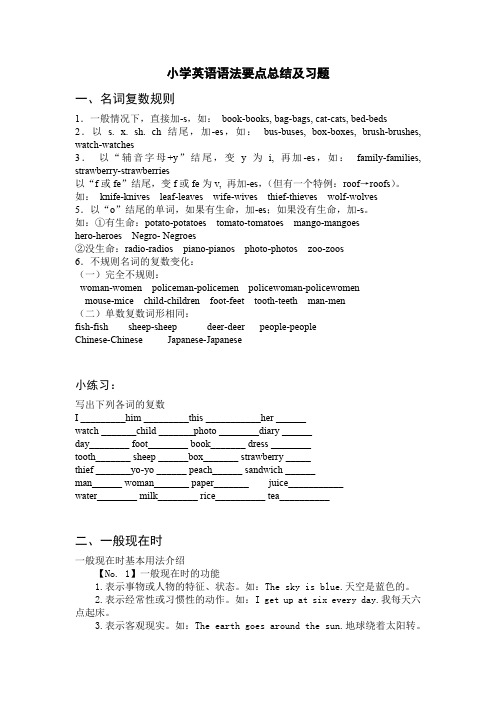
小学英语语法要点总结及习题一、名词复数规则1.一般情况下,直接加-s,如:book-books, bag-bags, cat-cats, bed-beds2.以s. x. sh. ch结尾,加-es,如:bus-buses, box-boxes, brush-brushes, watch-watches3.以“辅音字母+y”结尾,变y为i, 再加-es,如:family-families, strawberry-strawberries以“f或fe”结尾,变f或fe为v, 再加-es,(但有一个特例:roof→roofs)。
如:knife-knives leaf-leaves wife-wives thief-thieves wolf-wolves5.以“o”结尾的单词,如果有生命,加-es;如果没有生命,加-s。
如:①有生命:potato-potatoes tomato-tomatoes mango-mangoeshero-heroes Negro- Negroes②没生命:radio-radios piano-pianos photo-photos zoo-zoos6.不规则名词的复数变化:(一)完全不规则:woman-women policeman-policemen policewoman-policewomenmouse-mice child-children foot-feet tooth-teeth man-men(二)单数复数词形相同:fish-fish sheep-sheep deer-deer people-peopleChinese-Chinese Japanese-Japanese小练习:写出下列各词的复数I _________him _________this ___________her ______watch _______child _______photo ________diary ______day________ foot________ book_______ dress ________tooth_______ sheep ______box_______ strawberry _____thief _______yo-yo ______ peach______ sandwich ______man______ woman_______ paper_______ juice___________water________ milk________ rice__________ tea__________二、一般现在时一般现在时基本用法介绍【No. 1】一般现在时的功能1.表示事物或人物的特征、状态。
(完整版)小学英语语法大全-附练习题,推荐文档

小学英语语法大全-附练习题Contents第一章名词1.名词的数2.名词的格第二章代词1.人称代词2.物主代词第三章冠词与数词1.冠词2.数词第四章一般现在时态第五章现在进行时态第六章句型1.陈述句2.疑问句3.祈使句4.There be 句型与have\ has第七章总结考试第一章名词 (Noun )名词的概念在生活中,我们会接触到各种各样的人和事物,用来表示这些人或事物名称的词就是名词。
一、名词的数名词的数指名词的单数和复数形式。
可数名词表示“一个”时用单数, “两个以上”时用复数;不可数名词表示量时, 通常用“数词+单位+of+物质名词”的形式,如a piece of bread (一片面包),变monkey --- monkeys 5.以 3'结尾的名词,复数一般在词尾加“ s”,但个别加es”tomato --- tomatoes (西红柿) 词尾读音[z ]potato --- potatoes (土豆) zoo --- zoos (动物园) photo --- photos (照片)* (以 o"结尾,复数加 es”)口诀:黑人(Negro )英雄(hero ),左手拿着西红柿(tomato ),右手拿着破土豆(potato ), 头顶一个大芒果(mango )。
6.以f 或fe 结尾的词,多数变 leaf --- leaves (树叶) knife --- knives ( 小刀)*(以f 或fe 结尾的单词,需把 妻子(wife )持刀(knife )去宰 半(half )片树叶(leaf )遮目光。
*(以f 或fe 结尾的单词,直接加 s”的单词)口诀:长颈鹿(giraffe )站在屋檐(roof )下,左手拿着手绢(handkerchief ),右手拿着高尔夫球(golf )。
例:roof --- roofs (屋顶)7 .不规则名词复数的变化为复数时,只须将单位名词变为复数, *名词复数的构成法则1 . 一般情况下在词尾加 s. shop --- shops (商店) bag --- bags (书包) window --- windows ( 窗户)2 .以s, x, sh, ch 结尾的单词在词尾加 class --- classes 班级)box --- boxes (盒子) match --- matches(比赛) brush --- brushes (刷子)3 .以“辅音字母 +y”结尾的词, story --- stories (故事)4 .以“元音字母 +y” key --- keys如:two pieces of bread (两片面包)。
小学三年级阶段英语语法知识总结(带练习及答案)
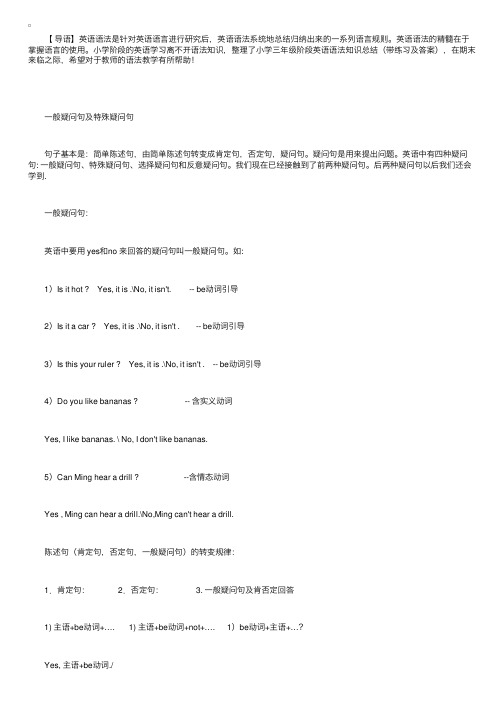
【导语】英语语法是针对英语语⾔进⾏研究后,英语语法系统地总结归纳出来的⼀系列语⾔规则。
英语语法的精髓在于掌握语⾔的使⽤。
⼩学阶段的英语学习离不开语法知识,整理了⼩学三年级阶段英语语法知识总结(带练习及答案),在期末来临之际,希望对于教师的语法教学有所帮助! ⼀般疑问句及特殊疑问句 句⼦基本是:简单陈述句,由简单陈述句转变成肯定句,否定句,疑问句。
疑问句是⽤来提出问题。
英语中有四种疑问句: ⼀般疑问句、特殊疑问句、选择疑问句和反意疑问句。
我们现在已经接触到了前两种疑问句。
后两种疑问句以后我们还会学到. ⼀般疑问句: 英语中要⽤ yes和no 来回答的疑问句叫⼀般疑问句。
如: 1)Is it hot ? Yes, it is .\No, it isn't. -- be动词引导 2)Is it a car ? Yes, it is .\No, it isn't . -- be动词引导 3)Is this your ruler ? Yes, it is .\No, it isn't . -- be动词引导 4)Do you like bananas ? -- 含实义动词 Yes, I like bananas. \ No, I don't like bananas. 5)Can Ming hear a drill ? --含情态动词 Yes , Ming can hear a drill.\No,Ming can't hear a drill. 陈述句(肯定句,否定句,⼀般疑问句)的转变规律: 1.肯定句: 2.否定句: 3. ⼀般疑问句及肯否定回答 1) 主语+be动词+…. 1) 主语+be动词+not+…. 1)be动词+主语+…? Yes, 主语+be动词./ No, 主语+be动词+not. I am a teacher. I am not a teacher. Are you a teacher? --Yes, I am./ No, I am not. My mother is thin. My mother is not /isn't thin. Is your mother thin? --Yes, she is./ No, she isn't. They are insects. They are not/aren't insects. Are they insects? --Yes. they are./ No, they aren't. 2) 主语+情态动词can+… 2) 主语+情态动词can+ not+…. 2)情态动词can+主语+…? Yes, 主语+情态动词can/ No,主语+情态动词can+ not He can jump. He can not/can't jump. Can he jump? --Yes,he can./ No, he can't. 3) 主语+动词+…. 3) 主语+助动词do/does+not 3)助动词do/does+主语 +…. 动词原形 +….动词原形? Yes, 主语+助动词do/does. No, 主语+助动词do/does+not. He likes to eat apples. He doesn't like to eat apples. Does he like to eat apples? Yes,he does./ No,he doesn't. We like to eat apples. We don't like to eat apples. Do you like to eat apples? Yes,we do. /No,we don't. ⼆. 祈使句:表⽰请求、命令、建议或劝告等的句⼦叫祈使句,主语you常省略。
PEP小学六年级英语下册复习语法知识及配套习题
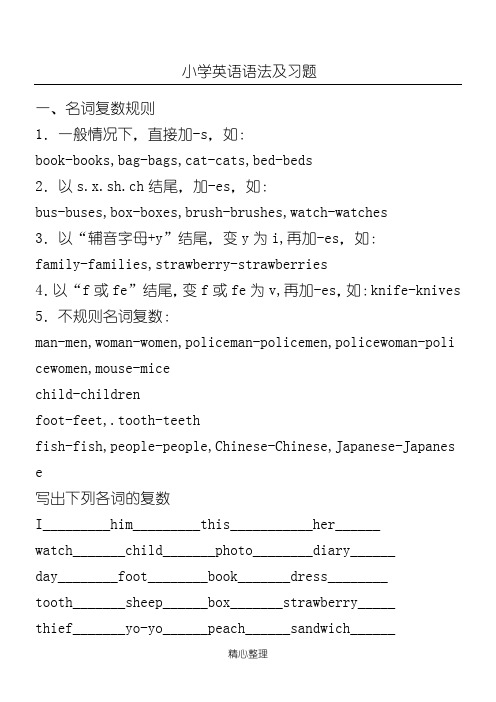
小学英语语法及习题一、名词复数规则1.一般情况下,直接加-s,如:book-books,bag-bags,cat-cats,bed-beds2.以s.x.sh.ch结尾,加-es,如:3.以4.以5eI_________him_________this___________her______ watch_______child_______photo________diary______ day________foot________book_______dress________ tooth_______sheep______box_______strawberry_____ thief_______yo-yo______peach______sandwich______man______woman_______paper_______??????juice___________ water________milk________rice__________tea__________ 二、一般现在时一般现在时基本用法介绍【No.1】一般现在时的功能或"-es"一般现在时的变化1.be动词的变化。
否定句:主语+be+not+其它。
如:Heisnotaworker.他不是工人。
一般疑问句:Be+主语+其它。
如:-Areyouastudent?-Yes.Iam./No,I'mnot.特殊疑问句:疑问词+一般疑问句。
如:Whereismybike?2.行为动词的变化。
否定句:主语+don't(doesn't)+动词原形(+其它)。
如:动词12.以s.x.sh.ch.o结尾,加-es,如:guess-guesses,wash-washes,watch-watches,go-goes3.以“辅音字母+y”结尾,变y为i,再加-es,如:study-studies 一般现在时用法专练:一、写出下列动词的第三人称单数drink________go_______stay________make________look_________have_______pass_______????carry____ come________?????watch______plant_______fly________ study_______brush________do_________????teach_______ 二、用括号内动词的适当形式填空。
小学五。六年级英语语法汇总)
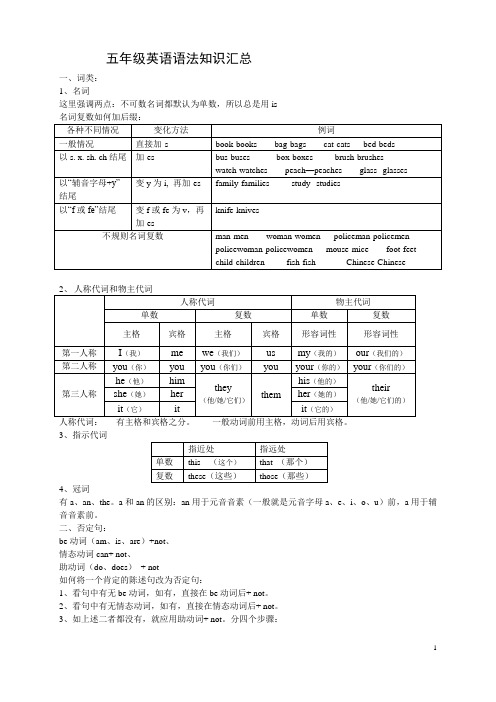
五年级英语语法知识汇总一、词类:1、名词这里强调两点:不可数名词都默认为单数,所以总是用is名词复数如何加后缀:人称代词:有主格和宾格之分。
一般动词前用主格,动词后用宾格。
3、指示代词4、冠词有a、an、the。
a和an的区别:an用于元音音素(一般就是元音字母a、e、i、o、u)前,a用于辅音音素前。
二、否定句:be动词(am、is、are)+not、情态动词can+ not、助动词(do、does)+ not如何将一个肯定的陈述句改为否定句:1、看句中有无be动词,如有,直接在be动词后+ not。
2、看句中有无情态动词,如有,直接在情态动词后+ not。
3、如上述二者都没有,就应用助动词+ not。
分四个步骤:(1)肯定陈述句中本来是没有助动词的,要加上去,位置在主语(某人或某物)后,动词前。
(2)确定助动词用do、does,根据句中动词,动词是原形的助动词就用do,动词是第三人称单数的助动词就用does,(3)在助动词后加not。
(4)原句中动词假如发生变化就要恢复成原形。
强调一点,有some的要考虑是否要用any。
三、一般疑问句。
如何将一个肯定的陈述句改为一般疑问句:1、看句中有无be动词,如有,把be动词提到句首即可。
2、看句中有无情态动词,如有,把情态动词提到句首即可。
3、如上述二者都没有,就应把助动提到句首。
分四个步骤:(1)肯定陈述句中本来是没有助动词的,要加上去,位置在主语(某人或某物)后,动词前。
(2)确定助动词用do还是does,根据句中动词,动词是原形的助动词就用do,动词是第三人称单数的助动词就用does(3)把助动词后提到句首。
(4)原句中动词假如发生变化就要恢复成原形。
强调一点,有some的要考虑是否要用any。
四、特殊疑问句。
表示疑问,有疑问词(在开头),回答有很多种可能。
1、一般现在时(1)一般现在时中的be动词:一般用原形:am is aream用于第一人称单数(I);is用于第三人称单数(he she it和其他人名或称谓,如:Ben his sister 等);are用于第二人称单数(you)和所有复数(包括第一人称复数we、第二人称复数you;第三人称复数they和其他复数,如the children 、his parents等)。
2023年小学六年级毕业英语语法复习要点归纳人教版

小学英语语法点复习归纳一、名词复数规则1.一般状况下,直接加-s,如:book-books, bag-bags, cat-cats, bed-beds 2.以s、x、sh、ch结尾,加-es,如:bus-buses, box-boxes, brush-brushes, watch-watches3.以“辅音字母+y”结尾,变y为i, 再加-es,如:family-families, strawberry-strawberries4.以“f或fe”结尾,变f或fe为v, 再加-es,如:knife-knives5.不规则名词复数:man- , woman- , policeman-policewoman- , mouse- child-foot- ,.tooth- fish- , people- ,Chinese- , Japanese-I _________him _________this ___________her ______watch _______that _______photo ________diary ______day________ foot________ book_______ dress ________tooth_______ sheep ______box_______ strawberry _____thief _______yo-yo ______ peach______ sandwich ______tomato______ potato_______ paper_______ juice___________water________ milk________ rice__________ tea__________pork mutton二、一般目前时1.重点:(句子特性;以及第三人称动词旳变化原则)2. 句子出现旳时间标志为:often, usually, everyday,…等词汇)3. 动词变化规则:1).一般状况下,直接加-s,如:cook-cooks, milk-milks,climbs,cleans 2).以s. x. sh. ch. o结尾,加-es,如:guess-guesses, wash-washes, watch-watches, go-goes3).以“辅音字母+y”结尾,变y为i, 再加-es,如:study-studies专题练习:一.写出一下东西旳第三人称单数形式:drink ________ go _______ stay ________ make ________look _________ have_______ pass_______ carry ____come________ watch______ plant_______ fly ________study_______ brush________ do_________ teach_______二.用所给单词旳对旳形式填空1. He often ________(have) dinner at home.2. Daniel and Tommy _______(be) in Class One.3. We _______(not watch) TV on Monday.4. Nick _______(not go) to the zoo on Sunday.5. ______ they ________(like) the World Cup?6. What _______they often _______(do) on Saturdays?7. _______ your parents _______(read) newspapers every day?8. The girl _______(teach) us English on Sundays.9. She and I ________(take) a walk together every evening.10. There ________(be) some water in the bottle.11. Mike _______(like) cooking.12. They _______(have) the same hobby.13. My aunt _______(look) after her baby carefully.14. You always _______(do) your homework well.15. I _______(be) ill. I’m staying in bed.16. She _______(go) to school from Monday to Friday.17. Liu Tao _______(do) not like PE.18. The child often _______(watch) TV in the evening.19. Su Hai and Su Yang _______(have) eight lessons this term.20. What day _______(be) it today?三、目前进行时1.概念:表达正在进行旳动作。
小学英语1-6年级必备基础语法要点汇总

小学英语1-6年级必备基础语法要点汇总一般来说,小学英语的学习主要涉及一些比较基础的英语知识,掌握好这些基础知识,就能为以后英语的学习打下良好的基础。
针对小学英语的特点总结出应该掌握的基本语法,具体包括以下内容:词性动词、名词和形容词在英语里与汉语里有类似,也有区别,不太容易区分,如不能一眼看出,可用如下方法:在一个词前面加量词(不定冠词),“一(个、张等)”,如说得通,一般认为是名词;如果说不通,再把“很”加在词的前面去判断,说得通一般就是形容词;都说不通就是动词。
1动词这里所说的动词是指各种动词总称,其中包括行为动词(就是我们平时总说的那种动词)、be动词、情态动词。
(1)行为动词表示某一动作或行为。
如:walk、love等。
行为动词我们已学过它们的四种形式:原形、+s/es、+ed、+ing,(2)be动词口诀:我用am,你用are,is用在他她它,所有复数全用are。
肯定和否定句My hair is(not)long.Her eyes are(not)small.一般疑问句Am I a Chinese?Yes,you are.No,you aren’t.Are they American?Yes,they are.No,they a ren’t.Is the cat fat?Yes,it is.No,it isn’t.我们现在学过的be动词大致分两类:is、am、are为一类,一般用于一般现在时、现在进行时和一般将来时中,was和were为另一类,一般用于一般过去时。
(3)情态动词情态动词也是一类特殊的动词,平时我们不把它说成是动词。
情态动词可以和行为动词同时出现在同一个句子中。
我们现在学过的情态动词有:can、must、should、would、may。
接触最多的是can。
情态动词后动词总是用原形。
(不受其他任何条件影响)2名词英语中名词有单复数之分。
判断的关键词往往是be动词,be动词如果是am、is或was,名词就用原形;be动词如果是are或were,名词就加s或es。
小学英语1-6年级语法系统总结(绝对值得收藏)

小学英语1-6年级语法系统总结(绝对值得收藏)2015-08-17 晴娃娃88文章来源阅 807 转 40转藏到我的图书馆微信分享:一、小学英语形容词性物主代词1、形容词性物主代词8个:My your his her its our your their我的你的他的她的它的我们的你们的他(她、它)们的2、形容词性物主代词的特点:1)译成汉语都有'的' eg:my 我的their 他们的2)后面加名词:eg:my backpack his name3)前后不用冠词a an theThis is a my eraser(错误) That is your a pen(错误) It's his the pen(错误)3、I(物主代词)my you(物主代词)your he (物主代词)her we (物主代词) our注:在变物主代词时,把原题所给的词加上的,再译成单词就可以了。
二、小学英语名词性物主代词1、名词性物主代词和形容词性物主代词一样有8个:Mine yours his hers its ours yours theirs我的你的他的她的它的我们的你们的他(她、它)们的2、名词性物主代词的特点:1)译成汉语都有'的' 2)后面不加名词3)名词性物主代词=形容词性物主代词+名词Eg:1、thepen is mine 钢笔是我的(mine=my pen)以上就是小学英语名词性物主代词全文,希望能给大家带来帮助!三、小学英语单数的句子变成复数的句子把单数的句子成复数的句子很简单:变法是把能变成复数的词变成复数,但a或an要把去掉。
特殊疑问词、形容词、国家及地点通常不变。
Eg:把下列句子变成复数1, I have a car ----we have cars2, He is an American boy. ----They are American boys3, It is a car ----They are cars4, This is an eraser ----These are erasers5, That is a backpsck -----Those are backpacks6,I'm an English teather ------We are English teathers7,It's a new shirt---- They are new shirts8,He's a boy ----They are boys9,She's a singer ------They are singers10,What's this in English?---- What are these in English?四、小学英语名词的数语法名词有单数和复数两种形式1、名词的单数:表示一个人或一个事物2、名词的复数:表示一个人以上的人或事物名词复数的变化规律如下:1、多数情况下在名词后面加S,s 在清辅音后读【S】2、以s,x,sh,ch为结尾的词在词尾加es, es读作【iz】3、以f,fe为结尾的词去掉f或fe加ves,ves读作【vz】4、以辅音加y结尾的词,变y 为ies5、以元音加y结尾的词,直接加s6、不规则变化Man-men woman-women policeman-policemenPolicewoman-policewomen 这种情况下a变成e(1)、单复数同形Chinese-chinese Japanese-japanese sheep -sheep deer -deer(2)、This 这个these这些(复数) that那个those那些(复数) I我we我们(复数) he他she 她it它they他、它、她们(复数) am ,is是are(复数)五、小学英语人称代词主格及宾格人称代词分为主格和宾格,主格和宾格区别:主格和宾格汉语意思相同,但位置不同。
- 1、下载文档前请自行甄别文档内容的完整性,平台不提供额外的编辑、内容补充、找答案等附加服务。
- 2、"仅部分预览"的文档,不可在线预览部分如存在完整性等问题,可反馈申请退款(可完整预览的文档不适用该条件!)。
- 3、如文档侵犯您的权益,请联系客服反馈,我们会尽快为您处理(人工客服工作时间:9:00-18:30)。
小学英语语法要点及习题(名词复数规则)1.一般情况下,直接加-s,如:book-books, bag-bags, cat-cats, bed-beds2.以s. x. sh. ch结尾,加-es,如:bus-buses, box-boxes, brush-brushes, watch-watches3.以“辅音字母+y”结尾,变y为i, 再加-es,如:family-families, strawberry-strawberries4.以“f或fe”结尾,变f或fe为v, 再加-es,如:knife-knives5.不规则名词复数:man-menwoman-womenpoliceman-policemenpolicewoman-policewomenmouse-micechild-childrenfoot-feettooth-teethfish-fishpeople-peopleChinese-ChineseJapanese-Japanese小练习:写出下列各词的复数I _________him _________this ___________her ______ watch _______child _______photo ________diary ______day________ foot________ book_______ dress ________ tooth_______ sheep ______box_______ strawberry _____ thief _______yo-yo ______ peach______ sandwich ______ man______ woman_______ paper_______ juice___________ water________ milk________ rice__________ tea__________小学英语语法总结及习题(一般现在时)一般现在时基本用法介绍【No. 1】一般现在时的功能1.表示事物或人物的特征、状态。
如:The sky is blue.天空是蓝色的。
2.表示经常性或习惯性的动作。
如:I get up at six every day.我每天六点起床。
地球绕着太阳转。
3.表示客观现实。
如:The earth goes around the sun.一般现在时的构成1. be动词:主语+be(am,is,are)+其它。
如:I am a boy.我是一个男孩。
2.行为动词:主语+行为动词(+其它)。
如:We study English.我们学习英语。
当主语为第三人称单数(he, she,it)时,要在动词后加"-s"或"-es"。
如:Mary likes Chinese.玛丽喜欢汉语。
一般现在时的变化1. be动词的变化。
否定句:主语+ be + not +其它。
如:He is not a worker.他不是工人。
一般疑问句:Be +主语+其它。
如:-Are you a student?-Yes. I am. / No, I'm not.特殊疑问句:疑问词+一般疑问句。
如:Where is my bike?2.行为动词的变化。
否定句:主语+ don't( doesn't ) +动词原形(+其它)。
如:I don't like bread.当主语为第三人称单数时,要用doesn't构成否定句。
如:He doesn't often play.一般疑问句:Do( Does ) +主语+动词原形+其它。
如:- Do you often play football?- Yes, I do. / No, I don't.当主语为第三人称单数时,要用does构成一般疑问句。
如:- Does she go to work by bike?- Yes, she does. / No, she doesn't.特殊疑问句:疑问词+一般疑问句。
如:How does your father go to work?动词+s的变化规则1.一般情况下,直接加-s,如:cook-cooks, milk-milks2.以s. x. sh. ch. o结尾,加-es,如:guess-guesses, wash-washes, watch-watches, go-goes 3.以“辅音字母+y”结尾,变y为i, 再加-es,如:study-studies一般现在时用法专练:一、写出下列动词的第三人称单数drink ________ go _______ stay ________ make ________look _________ have_______ pass_______ carry ____come________ watch______ plant_______ fly ________study_______ brush________ do_________ teach_______二、用括号内动词的适当形式填空。
1. He often ________(have) dinner at home.2. Daniel and Tommy _______(be) in Class One.3. We _______(not watch) TV on Monday.4. Nick _______(not go) to the zoo on Sunday.5. ______ they ________(like) the World Cup?6. What _______they often _______(do) on Saturdays?7. _______ your parents _______(read) newspapers every day?8. The girl _______(teach) us English on Sundays.9. She and I ________(take) a walk together every evening.10. There ________(be) some water in the bottle.11. Mike _______(like) cooking.12. They _______(have) the same hobby.13. My aunt _______(look) after her baby carefully.14. Y ou always _______(do) your homework well.15. I _______(be) ill. I’m staying in bed.16. She _______(go) to school from Monday to Friday.17. Liu Tao _______(do) not like PE.18. The child often _______(watch) TV in the evening.19. Su Hai and Su Y ang _______(have) eight lessons this term.20. -What day _______(be) it today?-It’s Saturday.三、按照要求改写句子1. Daniel watches TV every evening.(改为否定句)___________________________________________________2. I do my homework every day.(改为一般疑问句,作否定回答)_______________________________________________________ 3. She likes milk.(改为一般疑问句,作肯定回答)___________________________改为一般疑问句,作否定回答) 4. Amy likes playing computer games.(___________________________________________________改为否定句)5. We go to school every morning.(_______________________________________________________改为否定句)6. He speaks English very well.(___________________________________________________对划线部分提问)7. I like taking photos in the park.(_______________________________________________________对划线部分提问)8. John comes from Canada.(___________________________________________________改为一般疑问句,作否定回答)9. She is always a good student.(_______________________________________________________ 10. Simon and Daniel like going skating.(改为否定句)___________________________________________________四、改错(划出错误的地方,将正确的写在横线上)1. Is your brother speak English? __________________2. Does he likes going fishing? __________________3. He likes play games after class. __________________4. Mr. Wu teachs us English. __________________5. She don’t do her homework on Sundays. _________________小学英语语法总结及习题(现在进行时)1.现在进行时表示现在正在进行或发生的动作,也可表示当前一段时间内的活动或现阶段正在进行的动作。
2.现在进行时的肯定句基本结构为be+动词ing.3.现在进行时的否定句在be后加not。
